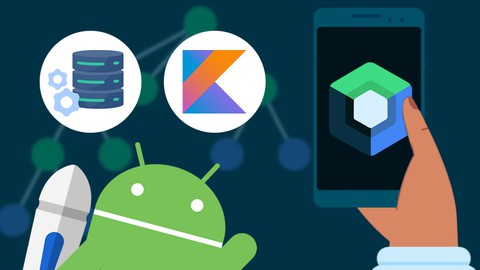
Android Developer = Compose + MVVM + Clean Architecture
Android Developer = Compose + MVVM + Clean Architecture, available at $19.99, has an average rating of 4.5, with 22 lectures, based on 14 reviews, and has 136 subscribers.
You will learn about Create an app from scratch by using the best tools available Organise and Architect your codebase according to best practices such as MVVM and Clean Architecture Operate with local and remote data sources and how to combine them Split your app into feature modules Migrate to compose and variants of it Write a beautiful and concise code This course is ideal for individuals who are Beginner Android Developers who want to create apps the right way It is particularly useful for Beginner Android Developers who want to create apps the right way.
Enroll now: Android Developer = Compose + MVVM + Clean Architecture
Summary
Title: Android Developer = Compose + MVVM + Clean Architecture
Price: $19.99
Average Rating: 4.5
Number of Lectures: 22
Number of Published Lectures: 22
Number of Curriculum Items: 22
Number of Published Curriculum Objects: 22
Original Price: $89.99
Quality Status: approved
Status: Live
What You Will Learn
- Create an app from scratch by using the best tools available
- Organise and Architect your codebase according to best practices such as MVVM and Clean Architecture
- Operate with local and remote data sources and how to combine them
- Split your app into feature modules
- Migrate to compose and variants of it
- Write a beautiful and concise code
Who Should Attend
- Beginner Android Developers who want to create apps the right way
Target Audiences
- Beginner Android Developers who want to create apps the right way
Hello and welcome to my Android Development Architecture course!
In this course, we’ll build an app from scratch that displays an infinite list of movies that load lazily in blocks. We will implement a search function with real-time API calls and the ability to save movies to a local database in two different ways.
We’ll first create the screens by using the old layouts, then I’ll show you how to migrate to Compose in simple steps. You might be wondering: why not do this directly in Compose? Well, the answer is simple. Compose is a fairly new technology and not all projects have been migrated yet. You never know what kind of projects you’ll end up with. If you understand both systems and work with them as a professional, you will stand out from the crowd. A big advantage is that you can organize and design the migration yourself within your team!
But the most important thing about this app is not its functionality or its design. But how do we architect it and that’s why we will use tools that are proven to work best for Android development.
Here is a list of the technologies we will use:
Retrofit – One of the main network call libraries
Room – Google-recommended library for local databases
Koin – The pragmatic Kotlin Dependency Injection framework
Coil – to load network images
Gson – Json converter for API responses
Kotlin Flow and Coroutines – Asynchronous or non-blocking programming as an important part of the development landscape.
Ktlint – kotlin-linter
And also the Jetpack libraries offered by Google:
Pagination – for simple and infinite data loading
Navigation – for easy navigation between screens
Materials design – design framework
Compose – the latest Android UI framework
They are all configured and packaged in the standard MVVM or Model-View-ViewModel and Clean Architecture.
You’ll end up with 2 base projects, first with legacy xml layouting and second with the newest Compose technology. And because we’ll be using TMDB service, after this course you’ll have to possibility to develop your own ideas on top of it and thus, practice the fresh knowledge you just got!
This course is intended to be continually updated, meaning new modules will be added over time, increasing the price, but if you have already purchased the course you will not have to pay extra. And there’s always a 30-day money back guarantee if you decide to issue a refund!
Course Curriculum
Chapter 1: Introduction
Lecture 1: Important! Before you start.
Lecture 2: Android Studio setup (tools, plugins and cosmetics)
Lecture 3: Get the base project and overview
Chapter 2: Base app setup and Architecture Introduction
Lecture 1: Packages – How to organise your files and not get lost
Lecture 2: Fragments is all you need! Navigation and delegate your ViewBindings
Lecture 3: ViewModels – what are they and how to use them
Lecture 4: Retrofit – How to get data from services
Lecture 5: RecyclerView – The Good, the bad and the ugly (How to use it right way)
Lecture 6: Pagination – Can you load all the movies in one app ?
Lecture 7: Clean Architecture – What is a UseCase?
Chapter 3: Lets develop some features, shall we ?
Lecture 1: Search – Find me my favourite movie!
Lecture 2: Details – This movie looks nice, I wanna know more!
Lecture 3: Room – Local Database setup
Lecture 4: Saved – I like this movie! How can I save it?
Lecture 5: Modules – What is a Feature Module and how to set it up
Chapter 4: What is Compose and how to completely migrate to it
Lecture 1: Theming in Compose
Lecture 2: Creating your first components
Lecture 3: Compose your first screen
Lecture 4: Compose Search and Saved screens
Lecture 5: Compose Details screen
Lecture 6: How to navigate in Compose ?
Lecture 7: How can we improve Compose Navigation ?
Instructors
-
Cristian Lungu
Android Developer
Rating Distribution
- 1 stars: 0 votes
- 2 stars: 0 votes
- 3 stars: 1 votes
- 4 stars: 4 votes
- 5 stars: 9 votes
Frequently Asked Questions
How long do I have access to the course materials?
You can view and review the lecture materials indefinitely, like an on-demand channel.
Can I take my courses with me wherever I go?
Definitely! If you have an internet connection, courses on Udemy are available on any device at any time. If you don’t have an internet connection, some instructors also let their students download course lectures. That’s up to the instructor though, so make sure you get on their good side!
You may also like
- Top 10 Content Creation Courses to Learn in December 2024
- Top 10 Game Development Courses to Learn in December 2024
- Top 10 Software Testing Courses to Learn in December 2024
- Top 10 Big Data Courses to Learn in December 2024
- Top 10 Internet Of Things Courses to Learn in December 2024
- Top 10 Quantum Computing Courses to Learn in December 2024
- Top 10 Cloud Computing Courses to Learn in December 2024
- Top 10 3d Modeling Courses to Learn in December 2024
- Top 10 Mobile App Development Courses to Learn in December 2024
- Top 10 Graphic Design Courses to Learn in December 2024
- Top 10 Videography Courses to Learn in December 2024
- Top 10 Photography Courses to Learn in December 2024
- Top 10 Language Learning Courses to Learn in December 2024
- Top 10 Product Management Courses to Learn in December 2024
- Top 10 Investing Courses to Learn in December 2024
- Top 10 Personal Finance Courses to Learn in December 2024
- Top 10 Health And Wellness Courses to Learn in December 2024
- Top 10 Chatgpt And Ai Tools Courses to Learn in December 2024
- Top 10 Virtual Reality Courses to Learn in December 2024
- Top 10 Augmented Reality Courses to Learn in December 2024






















